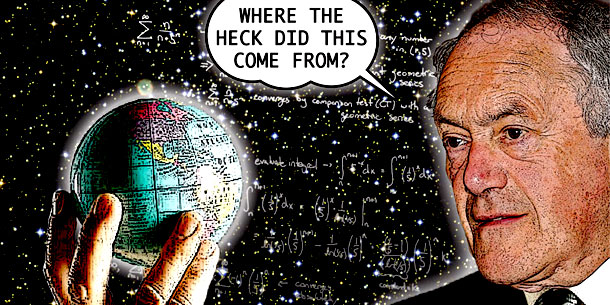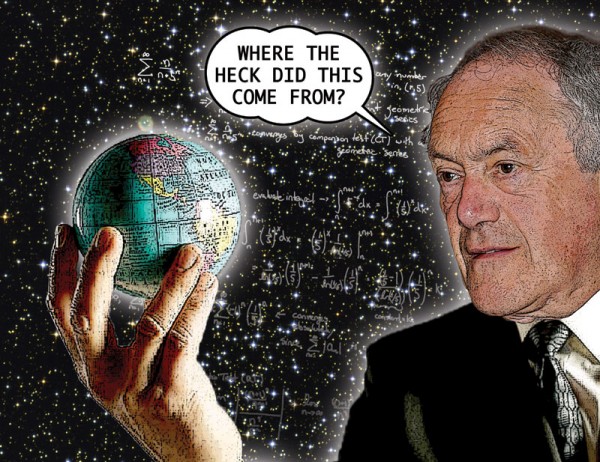This is an excerpt from a talk Dr. William Lane Craig gave during a public discussion, a debate, he had with Dr. Peter Atkins. Dr. Craig is a philosopher and a theologian. Dr. Atkins is a chemist and an outspoken atheist.
I believe that there are many reasons for the existence of God, but for this occasion I’m going to restrict myself to sketching briefly four different reasons why I think God exists.
NUMBER ONE: THERE IS THE ORIGIN OF THE UNIVERSE
Have you ever asked yourself where the universe came from, why everything exists instead of just nothing? Typically, atheists have said that the universe is just eternal, and uncaused. But the astrophysical evidence indicates that the universe began to exist in a great explosion called the Big Bang fifteen billion years ago. Most laymen do not appreciate that not only were all matter and energy created in that event, but physical space and time themselves. This is of upmost importance, for it implies, as the Cambridge astronomer Fred Hoyle points out, that the Big Bang theory requires the creation of the universe from nothing. Now, this tends to be very awkward for the atheist, for as Anthony Kenny of the Oxford University urges, a proponent of the Big Bang theory, at least if he is an atheist, must believe that the universe came from nothing and by nothing. But surly that doesn’t make sense because OUT OF NOTHING NOTHING COMES! So, where did the universe come from? Why does the universe exist, instead of just nothing. There must have been a cause which brought the universe into being.
We can summarize our argument thus far as follows. Premise one: whatever begins to exist has a cause. Two: the universe began to exist. Three: therefore, the universe has a cause.
The Big Bang theory requires the creation of the universe from nothing. Now, this tends to be very awkward for the atheist, for as Anthony Kenny of the Oxford University urges, a proponent of the Big Bang theory, at least if he is an atheist, must believe that the universe came from nothing and by nothing. But surly that doesn’t make sense because OUT OF NOTHING NOTHING COMES!
Now, from the very nature of the case as the cause of space and time, this cause must be an uncaused, changeless, timeless, and immaterial being of unimaginable power which created the universe. It must be timeless, and therefore changeless because it created time, because it also created space, it must also transcend space as well and therefore be immaterial, not physical. Moreover, I would argue that it must also be personal, for a changeless, impersonal cause can never exist without its effect. If the changeless, impersonal conditions for any effect are timelessly present, then their effect must be timelessly present as well. For example, the cause for water’s freezing is the temperature being below zero degrees centigrade. If the temperature were below zero from eternity, then any water around would be frozen from eternity. It would be impossible for the water to just begin to freeze a finite time ago. The only way for the cause to be timeless and for the effect to begin a finite time ago is for the cause to be a personal agent who freely chooses to create a new effect without any prior determining conditions. For example, a man sitting from eternity could freely will to stand up, and thus you would have a new effect arise from an eternal cause. Thus we are brought not merely to a transcendent cause of the universe, but to its personal creator.
In his book The Creation, Dr. Atkins struggles mightily to explain how the universe could come into existence uncaused, out of nothing. In the end, he finds himself trapped in self-contradiction. He states, “Now we go back in time, beyond the moment of creation, to when there was no time, and to where there was no space.” At this “time before time”, he imagines a swirling dust of mathematical points which recombine again and again and again, and finally come, by trial and error, to form our space-time universe. It needs to be honestly said that this is not a scientific hypothesis. It is pop metaphysics, and of the worst kind, for it is obviously self-contradictory since it assumes time and space in order to explain the origin of time and space. As scientist David Park writes, it is deceptively easy to imagine events before the Big Bang, but in physics there is no way to make sense of these imaginings. As if this were not bad enough, Dr. Atkins compounds the problem by asking where the mathematical points came from. His answer? Time brought the points into being and the points brought time into being. This is like saying that the chicken brought the egg into being and the egg brought the chicken into being. It’s no wonder that in his review of Dr. Atkins’ book in The Times Literary Supplement the philosopher John Leslie asks incredulously, ”How could such nonsense have been churned out by the author of a superb textbook like Physical Chemistry?” In fact, Dr. Atkins’ Oxford University colleague Keith Ward in his book God, Chance and Necessity points out no less than seven such logical fallacies in Dr. Atkins’ scenario. Ward concludes that it is “blatantly self-contradictory and so cannot be true”. By contrast, the view that theists have always held, that there is a personal creator of the universe is not only logically consistent, but it also follows logically from the premises which I have laid out.
The only way for the cause to be timeless and for the effect to begin a finite time ago is for the cause to be a personal agent who freely chooses to create a new effect without any prior determining conditions. For example, a man sitting from eternity could freely will to stand up, and thus you would have a new effect arise from an eternal cause. Thus we are brought not merely to a transcendent cause of the universe, but to its personal creator.
NUMBER TWO: THE COMPLEX ORDER IN THE UNIVERSE
During the last thirty years or so, scientists have discovered that the existence of intelligent life depends upon a delicate and complex balance of initial conditions simply given in the Big Bang itself. We now know that life prohibiting universes are vastly more probable than any life-permitting universe like ours. How much more probable? The answer is that the chances that the universe should be life-permitting are so infinitesimal as to be incalculable and incomprehensible. For example, Steven Hawking has estimated that if the rate of the universe’s expansion had been smaller by even one part in a hundred thousand billion million, the universe would have re-collapsed into a big fireball. Brandon Carter has calculated that the odds against the initial conditions being suitable for later star formation, without which planets could not exist, is one followed by a thousand billion billion zeros, at least. PCW Davies estimates that change in the strength of gravity or of the weak force by only one part in ten to the one hundredth power would have prevented a life-permitting universe. There are around fifty such quantities and constants present in the Big Bang which must be fine-tuned in this way if the universe is to permit life. So improbability is multiplied by improbability by improbability until our minds are reeling in incomprehensible numbers. There is no physical reason why these constants and quantities possess the values they do. The former agnostic physicist Paul Davies comments, “Through my scientific work I have come to believe more and more strongly that the physical universe is put together with an ingenuity so astonishing that I cannot accept it merely as a brute fact.” Similarly, Fred Hoyle remarks, “A common sense interpretation of the facts suggests that a super intellect has monkeyed with physics”. And Robert Jastrow, the head of NASA’s Goddard Institute for Space Studies has called this the most powerful evidence for the existence of God ever to come out of science.
We can summarize our reasoning as follows. Premise one: the fine tuning of the initial conditions of the universe is due to either natural law, chance, or design. Two: it is not due to either law or chance. Three: therefore, it is due to design.
NUMBER THREE: OBJECTIVE MORAL VALUES IN THE WORLD
If God does not exist, then objective moral values do not exist. Many theists and atheists agree on this point. Michael Ruse, a noted agnostic philosopher of science explains, “The position of the modern evolutionist is that morality is just an aid to survival and reproduction and any deeper meaning is illusory”. Friedrich Nietzsche, the great atheist of the last century who proclaimed the death of God, understood that the death of God meant the destruction of all meaning and value in life. I think that Friedrich Nietzsche was right. But we’ve got to be very careful here. The question here is not “Must we believe in God in order to live moral lives?”. I’m not claiming that we must. Nor is the question “Can we recognize objective moral values without believing in God?”. I think that we certainly can. Rather, the question is, “If God does not exist, do objective moral values exist?”. Like Niche and Ruse, I just don’t see any reason to think that in the absence of God the morality evolved by Homo sapiens is objective, and here Dr. Atkins would agree with me. He says, “I see no evidence for its absoluteness. And the ethics of a lion seem to be much different from the ethics of an antelope. As for human beings,” he says, “we are just slime on a planet belonging to one sun”. On the atheistic view, then, some action, say rape, may not be socially advantageous, and so in the course of human development has become taboo. But that does absolutely nothing to prove that rape is really wrong. On the atheistic view there’s really nothing wrong with your raping someone, thus without God, there is no absolute right and wrong. But the problem is that objective values do exist, and deep down we all know it. There is no more reason to deny the objective reality of moral values than the objective reality of the physical world. Actions like rape, cruelty, and child abuse aren’t just “socially unacceptable behavior”, they are moral abominations. Some things, at least, are really wrong. Similarly, love, equality, and self-sacrifice are really good.
“A common sense interpretation of the facts suggests that a super intellect has monkeyed with physics”.
Thus we can summarize this third consideration as follows. Premise one: if God does not exist, objective moral values do not exist. Two: objective values do exist. Three: therefore, God exists.
NUMBER FOUR: THE IMMEDIATE EXPERIENCE OF GOD
This isn’t really an argument for God’s existence, rather it’s the claim that you can know that God exists wholly apart from arguments, simply by immediately experiencing Him. This was the way people in the Bible knew God. As Professor John Hick explains, to them God was not an idea adopted by the mind, but an experiential reality which gave significance to their lives. Now, if this is so then there’s a danger that proofs for God could actually distract your attention from God Himself. If you’re sincerely seeking God, then God will make His existence evident to you. The Bible promises, draw near to God, and He will draw near to you. We must not so concentrate on the external proofs that we fail to hear the inner voice of God speaking to our own hearts. For those who listen, God becomes an immediate reality in their lives.
IN CONCLUSION
We have seen four reasons to think that God does exist. Together, these reasons constitute a powerful cumulative case for the existence of God. If one wants us to believe atheism instead, then he must first tear down all four of the reasons I’ve presented, and then in their place erect a case of his own to prove that God does not exist. Thus, until he does that, I think that we can conclude that theism is the more plausible world view.





